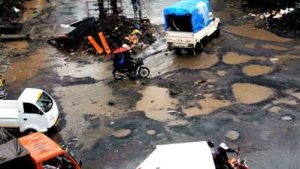The monsoon season has transformed Ulhasnagar’s roads into a battlefield, with Ulhasnagar potholes becoming the epicentre of a heated political confrontation between local legislators and municipal authorities. The deteriorating road conditions have prompted BJP MLA Kumar Uttamchand Ailani to issue an ultimatum to the Ulhasnagar Municipal Corporation (UMC) commissioner, demanding complete resolution of the pothole crisis by August 18, 2025.
The Ulhasnagar pothole crisis has reached a tipping point, with residents expressing mounting frustration over the municipal corporation’s apparent inability to maintain basic road infrastructure. BJP MLA Kumar Uttamchand Ailani, who represents the Ulhasnagar constituency and recently won the 2024 assembly elections with a significant margin, has taken a firm stand against the civic administration’s negligence.
The political ramifications of the Ulhasnagar pothole situation extend beyond mere infrastructure concerns, reflecting broader governance issues that have plagued the region. Ailani’s August 18 deadline represents a strategic political move designed to hold the municipal administration accountable for years of infrastructural neglect that has severely impacted residents’ daily lives.
The current monsoon season has exacerbated the Ulhasnagar potholes problem, transforming what were already problematic roads into virtually impassable stretches. Heavy rainfall has widened existing potholes and created new ones, making vehicular movement hazardous and pedestrian navigation extremely challenging.
Also Read: Ulhasnagar potholes: “Sharm Karo, Gadda Bharo”
More on Ulhasnagar BMC
Ulhasnagar, located 26 km from Thane City in Maharashtra’s Thane district and part of the Mumbai Metropolitan Region, serves as a crucial suburban hub with significant daily commuter traffic. The Ulhasnagar pothole crisis directly affects thousands of residents who depend on these roads for accessing essential services, employment opportunities, and transportation connectivity.
The seasonal nature of the monsoon has historically brought infrastructure challenges to Maharashtra’s urban cecentresbut the severity of the Ulhasnagar pothole situation this year has reached unprecedented levels, prompting immediate political intervention and public outcry.
Citizens across Ulhasnagar have organised informal protests and social media campaigns highlighting the dangerous conditions created by the Ulhasnagar potholes. Local business owners report decreased foot traffic and delivery challenges, while daily commuters face increased vehicle maintenance costs and time delays.
The Ulhasnagar potholes have become more than just road defects; they represent a symbol of civic administration failure and highlight the disconnect between elected representatives’ promises and ground-level implementation. Residents have documented numerous instances of vehicle damage, accidents, and health issues resulting from navigating these deteriorated road surfaces.
 Community leaders have emphasised that the Ulhasnagar pothole crisis affects all demographic groups, from elderly citizens struggling with mobility to young professionals facing daily commuting challenges. The situation has united diverse community segments in demanding immediate administrative action.
Community leaders have emphasised that the Ulhasnagar pothole crisis affects all demographic groups, from elderly citizens struggling with mobility to young professionals facing daily commuting challenges. The situation has united diverse community segments in demanding immediate administrative action.
The Ulhasnagar Municipal Corporation (UMC), which governs the city with 78 members and is headed by a mayor while being administered by a commissioner, faces intense scrutiny over its handling of the Ulhasnagar pothole crisis. The corporation’s apparent inability to proactively address monsoon-related infrastructure challenges has drawn sharp criticism from multiple stakeholders.
The UMC’s budget allocation for road maintenance and the effectiveness of its pre-monsoon preparation strategies have come under question. Critics argue that the Ulhasnagar pothole situation could have been prevented through better planning, adequate resource allocation, and timely intervention before the monsoon season commenced.
Municipal officials now face the challenging task of addressing the Ulhasnagar potholes within the stipulated deadline while managing budget constraints and coordinating with multiple departments to ensure comprehensive road repairs.
The Ulhasnagar population’s inconveniences extend beyond immediate transportation inconveniences, creating significant economic ripple effects throughout the local community. Small businesses report reduced customer accessibility, while service providers face increased operational costs due to vehicle maintenance and time delays.
Healthcare services have been particularly affected, with ambulances and emergency vehicles struggling to navigate roads marked by severe Ulhasnagar potholes. This situation poses serious risks to public health and safety, especially during medical emergencies requiring rapid response times.


The Ulhasnagar pothole situation highlights broader infrastructure development challenges facing rapidly growing urban centres in Maharashtra. Limited budget allocations, inadequate drainage systems, and substandard construction materials contribute to recurring road deterioration problems during monsoon seasons.
Technical experts suggest that addressing the Ulhasnagar potholes requires comprehensive planning that includes improved drainage systems, quality construction materials, and regular maintenance schedules. Short-term fixes without addressing underlying causes will likely result in recurring problems during future monsoon seasons.
As the August 18 deadline approaches, all stakeholders await concrete action from the municipal administration to resolve the Ulhasnagar potholes crisis. The political pressure applied by MLA Ailani has created an environment where failure to deliver results could have significant electoral consequences.
Residents expect not just immediate pothole repairs but comprehensive road infrastructure improvements that prevent similar situations in the future. The Ulhasnagar pothole crisis has become a litmus test for municipal governance effectiveness and political accountability.
The resolution of this crisis will likely influence future civic administration strategies and establish precedents for handling infrastructure challenges during monsoon seasons. Success in addressing the Ulhasnagar potholes could serve as a model for other municipalities facing similar challenges across Maharashtra.
The coming days will determine whether political pressure can effectively translate into tangible infrastructure improvements, ultimately benefiting Ulhasnagar’s residents who have endured months of deteriorated road conditions during this challenging monsoon season.

